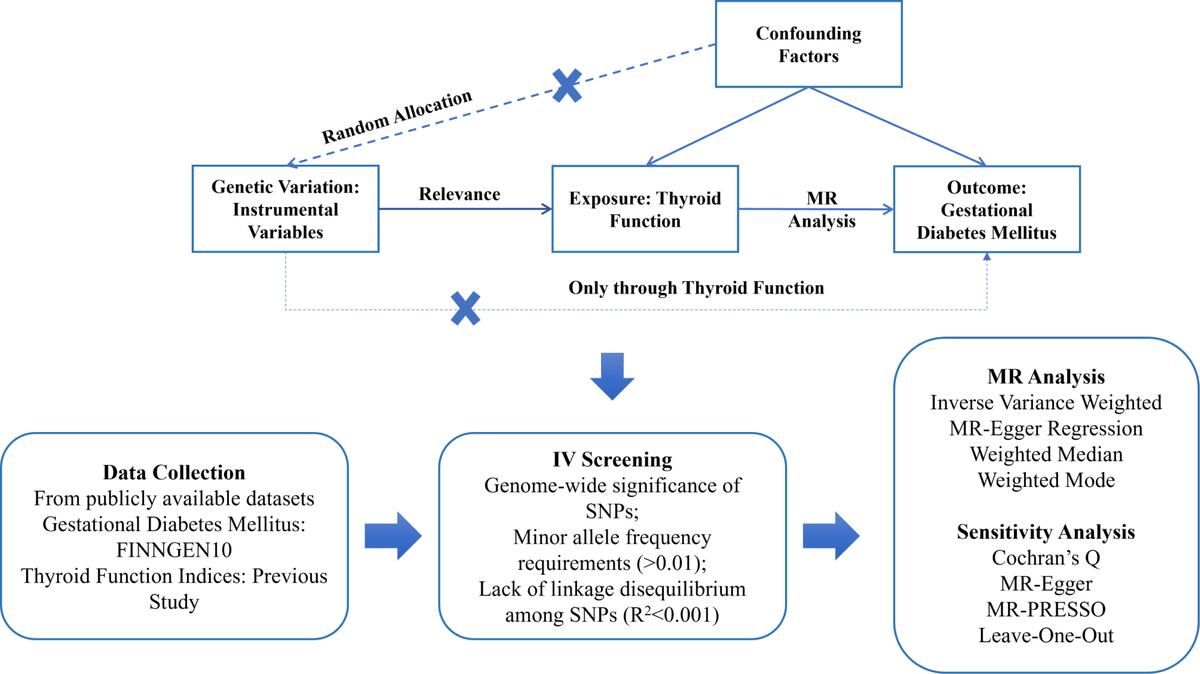Current issue
Archive
Manuscripts accepted
About the Journal
Editorial office
Editorial board
Section Editors
Abstracting and indexing
Subscription
Contact
Ethical standards and procedures
Most read articles
Instructions for authors
Article Processing Charge (APC)
Regulations of paying article processing charge (APC)
ENDOCRINOLOGY / RESEARCH PAPER
Unraveling the Underlying Causality: A Two-Sample Mendelian Randomization Analysis of the Link Between Thyroid Function and Gestational Diabetes Mellitus
1
Department of Endocrinology, Hainan General Hospital/Hainan Affiliated Hospital of Hainan Medical University, China
2
Department of Medical Record Management, Hainan General Hospital/Hainan Affiliated Hospital of Hainan Medical University, China
Submission date: 2024-11-26
Final revision date: 2025-03-28
Acceptance date: 2025-03-29
Online publication date: 2025-05-18
Corresponding author
Fei Wang
Department of Endocrinology, Hainan General Hospital/Hainan Affiliated Hospital of Hainan Medical University, 570311, Haikou, China
Department of Endocrinology, Hainan General Hospital/Hainan Affiliated Hospital of Hainan Medical University, 570311, Haikou, China
KEYWORDS
Pregnancy ComplicationsMendelian RandomizationGestational Diabetes MellitusThyroid FunctionEndocrine disturbances
TOPICS
ABSTRACT
Introduction:
Previous studies on the relationship between thyroid function disturbance and the development of gestational diabetes mellitus (GDM) have reported inconsistent results. We aim to investigate the relationship between thyroid function disturbance and GDM using Mendelian randomization (MR) analysis.
Material and methods:
This MR study utilized summary data from genome-wide association studies (GWAS) of thyroid function disturbance (18,297 individuals) and GDM (41,647 participants). The inverse variance weighted (IVW) method was primarily employed for analysis, complemented by the weighted median, weighted mode, and MR-Egger regression. Sensitivity analyses included MR-Egger, MR-PRESSO, Cochran’s Q, and leave-one-out approaches to assess the robustness of the findings.
Results:
The genetically determined thyroid function disturbance did not exhibit a statistically significant causal effect on GDM (FT4: OR = 0.99, 95% CI 0.88 - 1.11, P = 0.84; TT3: OR = 1.10, 95% CI 0.98 - 1.24, P = 0.12; FT3: OR = 1.16, 95% CI 0.96 - 1.40, P =0.13; TSH: OR = 1.01, 95% CI 0.94 - 1.08, P = 0.83; FT3 / FT4: OR = 1.05, 95% CI 0.58 - 1.91, P = 0.87). The sensitivity analysis revealed no significant horizontal pleiotropy and identified outliers that, once excluded, did not alter the negative findings, confirming the robustness of the outcomes.
Conclusions:
Our study found no significant causal effect of thyroid function disturbance on the risk of GDM based on the MR analysis, highlighting the need for further research to explore alternative mechanisms or potential subgroups where thyroid function may play a role in GDM development.
Previous studies on the relationship between thyroid function disturbance and the development of gestational diabetes mellitus (GDM) have reported inconsistent results. We aim to investigate the relationship between thyroid function disturbance and GDM using Mendelian randomization (MR) analysis.
Material and methods:
This MR study utilized summary data from genome-wide association studies (GWAS) of thyroid function disturbance (18,297 individuals) and GDM (41,647 participants). The inverse variance weighted (IVW) method was primarily employed for analysis, complemented by the weighted median, weighted mode, and MR-Egger regression. Sensitivity analyses included MR-Egger, MR-PRESSO, Cochran’s Q, and leave-one-out approaches to assess the robustness of the findings.
Results:
The genetically determined thyroid function disturbance did not exhibit a statistically significant causal effect on GDM (FT4: OR = 0.99, 95% CI 0.88 - 1.11, P = 0.84; TT3: OR = 1.10, 95% CI 0.98 - 1.24, P = 0.12; FT3: OR = 1.16, 95% CI 0.96 - 1.40, P =0.13; TSH: OR = 1.01, 95% CI 0.94 - 1.08, P = 0.83; FT3 / FT4: OR = 1.05, 95% CI 0.58 - 1.91, P = 0.87). The sensitivity analysis revealed no significant horizontal pleiotropy and identified outliers that, once excluded, did not alter the negative findings, confirming the robustness of the outcomes.
Conclusions:
Our study found no significant causal effect of thyroid function disturbance on the risk of GDM based on the MR analysis, highlighting the need for further research to explore alternative mechanisms or potential subgroups where thyroid function may play a role in GDM development.
Share
RELATED ARTICLE
We process personal data collected when visiting the website. The function of obtaining information about users and their behavior is carried out by voluntarily entered information in forms and saving cookies in end devices. Data, including cookies, are used to provide services, improve the user experience and to analyze the traffic in accordance with the Privacy policy. Data are also collected and processed by Google Analytics tool (more).
You can change cookies settings in your browser. Restricted use of cookies in the browser configuration may affect some functionalities of the website.
You can change cookies settings in your browser. Restricted use of cookies in the browser configuration may affect some functionalities of the website.



